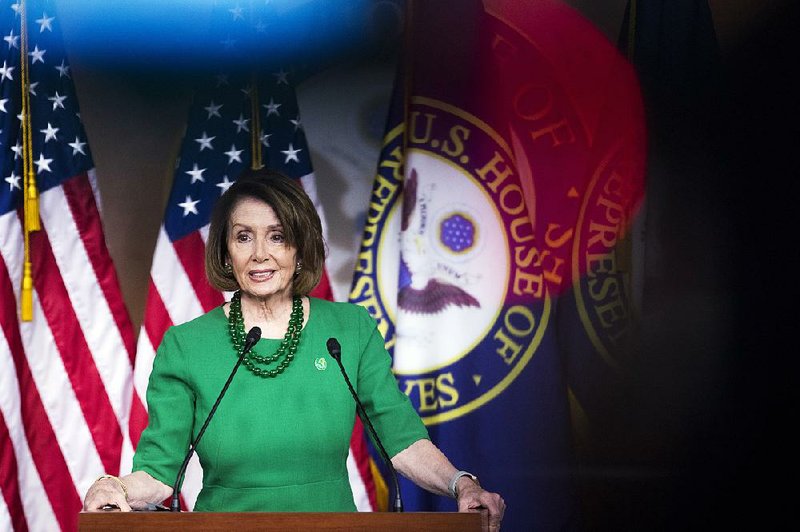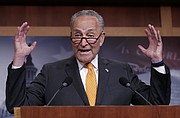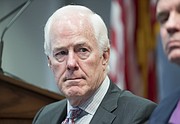Congress sent President Donald Trump a short-term spending bill Thursday to move back the deadline for a partial government shutdown, setting up a high-stakes fight over Trump's U.S.-Mexico border wall just before Christmas.
The legislation sets a new deadline of Dec. 21 for Trump and Democrats to resolve their standoff over funding for the wall, which is holding up action on spending bills to fund the Homeland Security Department and other federal agencies.
If the dispute is not resolved, funding for those agencies will expire, causing them to begin to shut down and furlough workers in the middle of the holiday season.
"We don't want to see the government shut down over Christmas, even though President Trump seems to brag that he wants one," Senate Minority Leader Charles Schumer, D-N.Y., said Thursday on the Senate floor. But, Schumer said, "The wall request is a nonstarter."
Without the short-term bill, the spending deadline would be at midnight today. But lawmakers this weekend agreed to a two-week extension as Congress participated in memorial events for former President George H.W. Bush.
The House and the Senate passed the legislation by voice vote Thursday. Trump is expected to sign the measure.
The bill does nothing to resolve the central dispute looming over the final days of the 115th Congress: Trump's demand for $5 billion to fund his long-promised wall along the border with Mexico.
House Democratic leader Nancy Pelosi, D-Calif., on Thursday rejected the idea of paying for Trump's border wall in exchange for helping hundreds of thousands of young people brought to the U.S. illegally as children avoid deportation.
Funding for the wall, a top Trump priority, and legal protections for so-called Dreamers, a key Democratic goal, should not be linked, Pelosi said.
"They're two different subjects," she said.
In their waning days in control of the House, Republicans know it's their last shot to get Trump the money for the wall that was the signature promise of his presidential campaign. Trump long claimed Mexico would pay for the wall, but he is now asking that it be funded by U.S. taxpayers.
"I do believe it's become more and more of a line in the sand, especially when you have just a week or two left to be able to finalize things and get it across the finish line," said Rep. Mark Walker, R-N.C. "This is a huge issue that not only the president campaigned on, but many other members said, 'Hey, this Congress we're going to get this done.'"
DEMOCRATS' PROPOSALS
Schumer and Pelosi are set to meet with Trump on Tuesday. But the party leaders have repeatedly rejected Trump's $5 billion demand, especially as Democrats prepare to take over the House in January.
Schumer and Pelosi on Thursday proposed extending funding at current levels for the Homeland Security Department through the end of the budget year -- which would allocate some $1.3 billion for border security and fencing for 2019.
Schumer said Trump's other option would be to accept a bipartisan bill negotiated in the Senate earlier this year providing $1.6 billion for border security and fencing, a deal that has been on the table for months.
"The one and only way we approach a shutdown is if President Trump refuses both of our proposals and demands $5 billion or more for a border wall," Schumer said.
Schumer called the spat over the wall unnecessary, noting that the administration has not spent more than $1 billion approved for border security in the budget year that ended Sept. 30. "The idea that they haven't spent last year's money and they're demanding such a huge amount this year makes no sense at all," he said.
Pelosi, speaking Thursday at a Capitol Hill news conference, said the border wall is "immoral, ineffective, and expensive, and the president -- he also promised that Mexico would pay for it. Even if they did, it's immoral still, and they're not going to pay for it."
Pelosi, who is seeking to become House speaker in January, said funding for the homeland agency should address border security and does not necessarily include a wall.
Protecting borders "is a responsibility we honor, but we do so by honoring our values as well," she added.
Trump is showing no signs of backing off his demand for wall money. Instead, in a tweet earlier this week, Trump returned to an earlier demand of $25 billion for the wall.
The president has repeatedly threatened to shut down the government over wall funding, and he was ready to do so in October. But GOP leaders, fearful of a messy fight days away from the midterm elections, persuaded him to wait, in part by promising to fight for wall funds in December.
Sen. John Cornyn, R-Texas, the No 2. Republican senator, said he "can't believe" the president would take Democrats' deal to extend the current $1.3 billion level.
"He wants money for border security, and we're not going to give him anything other than current level of funding?" Cornyn said. "I can't see how in the world that would be acceptable."
Senate Appropriations Chairman Richard Shelby, R-Ala., said that the last time he talked to Trump, the president was "steadfast" on getting the $5 billion he wants for the wall.
"Somebody'll have to blink," Shelby said, adding: "I think the president's going to have to get something. He is the president. He has sent some strong messages to most everybody. What that'll be, we're not sure yet."
Adding to the complications, lawmakers are planning to approve a large disaster relief package for recent wildfires and hurricanes, and attach it to whatever spending legislation moves. They are also hashing over disputes on a handful of other fronts, including an attempt by Democrats to add language to the spending package to block the Commerce Department from adding a question to the 2020 Census asking whether people are U.S. citizens.
EFFECTS OF A SHUTDOWN
Earlier this year, Congress passed spending bills funding about 75 percent of the government through next September, agreeing to big increases for the Pentagon, the Health and Human Services Department and other agencies. That means any shutdown would be limited in scope, affecting only the agencies whose 2019 budgets have not yet been approved and whose funding is set to expire Dec. 21.
Nevertheless, the impacts would be widespread. In addition to Homeland Security, other agencies affected include the Interior and Agriculture departments, the Department of Justice, NASA, the Commerce Department, the Department of Housing and Urban Development, and the Department of Transportation, as well as many smaller ones. These agencies employ more than 600,000 federal workers.
The impact of a partial shutdown would depend on whether it stretched into the following workweek. There were two brief partial government shutdowns earlier this year, one of which was resolved in a matter of hours.
A partial funding lapse could lead U.S. embassies overseas to cut back on staffing temporarily, because the State Department's budget would be held in limbo, and it could also force the Justice Department to slow or suspend a number of federal prosecutions.
The shutdown would not, however, suspend special counsel Robert Mueller's Russia investigation, as that inquiry has a separate, permanent funding source that cannot be changed by lawmakers.
Similarly, it would not have a direct impact on military operations or the pay of service members, as the Pentagon's budget was approved in September. Medicare and Social Security benefits would similarly continue to be paid and unaffected.
Federal employees labeled "nonessential" personnel would likely be sent home without pay for the duration of any shutdown if they work for agencies affected by the budget lapse. These personnel tend to be those whose jobs don't directly interface with national security or public health.
And a shutdown that lasts more than several days could force border patrol officers who are deemed "essential" to continue working without pay until Congress and the White House reach an agreement.
Information for this article was contributed by Erica Werner, Damian Paletta and Lisa Rein of The Washington Post; and by Matthew Daly, Alan Fram and Padmananda Rama of The Associated Press.
A Section on 12/07/2018


